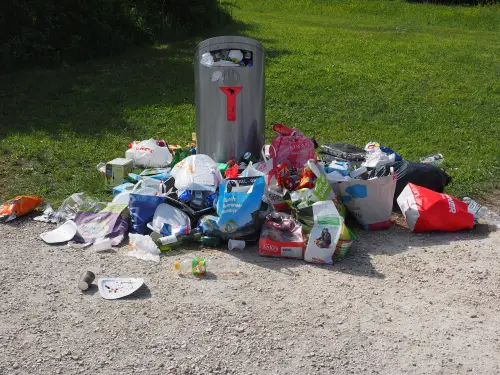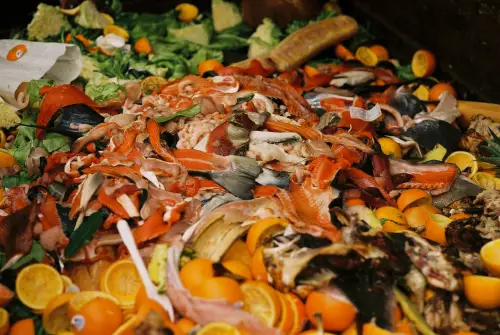Many people think that the words “trash” and “garbage” are one and the same: things that we throw away. Although they have been loosely interchanged by many people for years now, the two terms are actually different. In fact, your local solid waste management may even require you to separate your “trash” from your “garbage” or else they won’t collect your refuse. So, how are they different? Read on.
Summary Table
| Trash | Garbage |
| Dry, combustible or noncombustible things that you dispose of | Wet or organic waste from your kitchen and bathroom |
| Things that slowly decompose | Things that rapidly decompose |
Definitions

The word trash comes from the Old Norse word tros which means “fallen leaves and twigs.” Nowadays, it is used to refer to the dry, combustible or noncombustible things that you dispose of.
Examples of trash are the slow decomposing waste such as:
- Used paper
- Empty plastic containers
- Empty glass bottles or jars
- Cardboard boxes
- Broken furniture
- Tin or aluminum cans
- Wood or wood shavings
- Old Tires
- Old appliances
- Grass clippings
- Dry leaves
- Twigs

The earliest recorded use of the word garbage was in the 1580s. It originally referred to “the parts of an animal (such as the head, tail, feet, innards) that are not eaten.” Nowadays, it is used in American English to refer to the rapidly decomposing or organic waste from your kitchen and bathroom.
Examples of garbage are:
- Fruit and vegetable peels
- Eggshells
- Animal bones
- Coffee grounds
- Inedible stems, seeds, or roots
- Sanitary tissue
Trash vs Garbage
What, then, is the difference between trash and garbage?
Trash refers to the dry, slow decomposing waste such as paper, cardboard boxes, bottles, plastic, tires, etc. Garbage, on the other hand, refers to the wet waste from the kitchen and bathroom that rapidly decomposes such as animal parts, eggshells, fruits and vegetable peels, sanitary tissue etc.
Estimated Annual Waste Per Capita
The top five countries that have the largest estimated annual waste per capita (as of 2019) include:
- Canada at 36.1 metric tons
- Bulgart at 26.7 metric tons
- United States at 25.9 metric tons
- Estonia at 23.5 metric tons
- Finland at 16.6 metric tons
Interesting Facts About Garbage and Trash
Garbage and trash are a natural part of life, even when we recycle as much as possible. There’s always going to be some waste to take care of. Waste is produced at home, in the office, traveling, etc. Here are some interesting facts about waste you may not know:
- A baby goes through 8,000 disposable diapers by the time they’re potty trained.
- Glass takes 1million+ years to decompose completely in a landfill
- On average, Americans throw away about 600 million water bottles each day
- Most communities spend more on waste management than on school books, libraries, and parks
- According to the EPA (Environmental Protection Agency), the US creates about 250 million tons of trash each year
- The US creates about 624,000 metric tons of waste per day
- In the world, about 53.6 million metric tons of e-waste was generated in 2019
- About 40% of heavy metals in US landfills are from electronics
- Only 12.5% of e-waste is recycled
By the year 2040, it’s expected that there will be about 1.3 billion tons of plastic waste in the environment. Unfortunately, it takes about 400 years for plastic to degrade. In addition, about 8 million metric tons of plastic trash find their way into the world’s oceans each year.
The best way to curb these numbers is for each person to take care of how they get rid of trash and garbage. It’s also necessary to minimize waste as much as possible and reduce what ends up in landfills.





